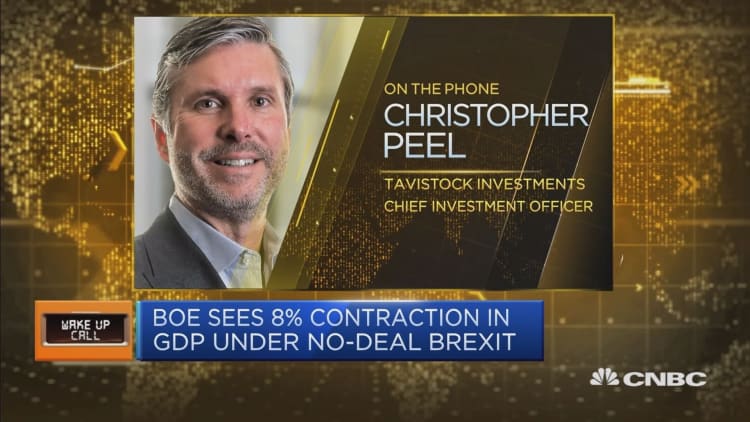
Brexit uncertainty is "unhelpful" for those seeking to buy a home and the U.K. Parliament needs to move forward with the country's departure from the EU, the CEO of the U.K.'s largest housebuilder by volume told CNBC Thursday.
The industry has struggled with the uncertainty surrounding the process of leaving the European Union, mostly when it comes to house purchases. Some buyers believe that prices should be lower due to the lack of clarity as to what will happen to the economy once the U.K. leaves the EU in March. And as a result, some are waiting for a drop in prices before making a decision.
"We definitely recognize that with Brexit there is a lot of uncertainty and clearly from our point of view, we recognize for our customers buying a house is a huge purchase and (the) uncertainty is an unhelpful backdrop," David Thomas, CEO of Barratt Developments, told CNBC's "Squawk Box Europe."
"So we would like to see us moving forward," Thomas said. "We would see it as positive if we can reach an agreement with the Europe and move forward."
The U.K. Parliament is due to vote on the country's withdrawal agreement with the EU on December 11. However, it's unclear at this stage how the voting will pan out, with many analysts predicting that U.K. lawmakers will reject the agreement.
The U.K. voted to leave the EU on June 23, 2016, and time is running out before the official departure date of March 29, 2019.
U.K. housebuilders have seen a resurgence over the last decade due to ultra-low interest rates aiding their ability to borrow. The last financial crisis also allowed these firms to purchase land at cheaper prices. But the market is still tight in places like London where housebuilding just can't keep up with demand.
"We have clearly seen long-term trends of rising house prices because we haven't been building enough homes. You can see from the government or from a Labour party (perspective) that we need to build a lot more homes. Last year we built 200,000 homes, the government said we need to be building 300,000 homes. I think that's a positive backdrop for a housebuilder," Thomas said about the prospects for the sector.

Brexit preparations
Nonetheless, housebuilders have, like all businesses in the U.K., carefully assessed how Brexit might impact their business models.
"U.K. housebuilding is very much about activity in the U.K.," Thomas explained. "The vast majority of the materials that we utilize in the business are manufactured in the U.K. So we are looking at some scenario-planning about 'what about the materials coming in from Europe or from elsewhere in the world'," he added.
Purchasing those materials that are not made in the U.K. is likely to cost more as a result of the departure from the EU.
At the moment, there are zero tariffs for trade between the U.K. and the EU, but that might no longer be the case once the Brexit transition period ends. The U.K. will also have to make its own deals with other countries, given that once it is out of the EU it will no longer be part of the agreements that Europe has struck with other nations.
The Bank of England warned Wednesday that in case lawmakers disapprove the deal and the country leaves without a deal, the UK economy could shrink by 8 percent and house prices could fall by almost a third.


